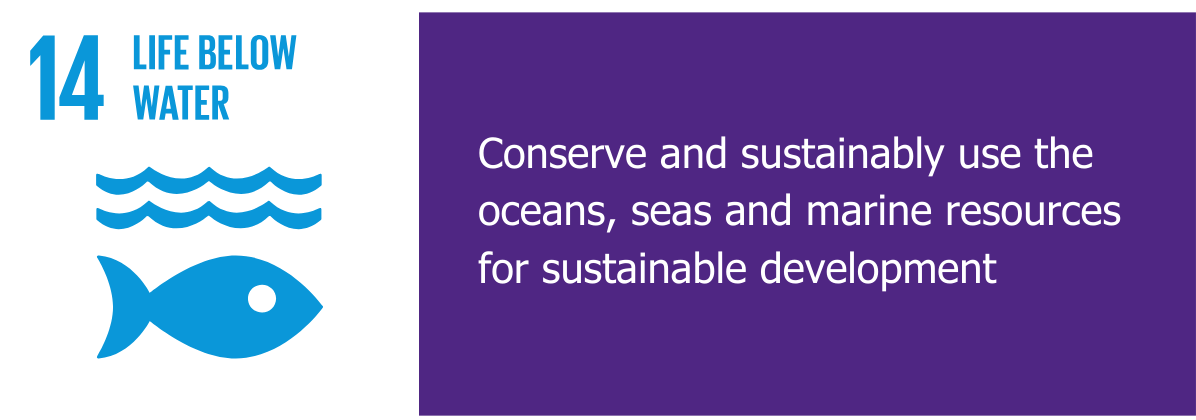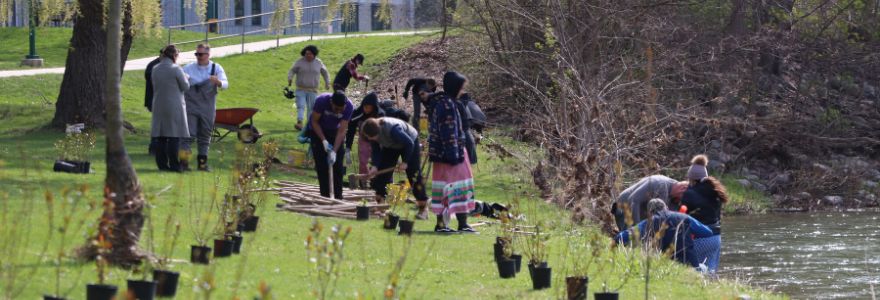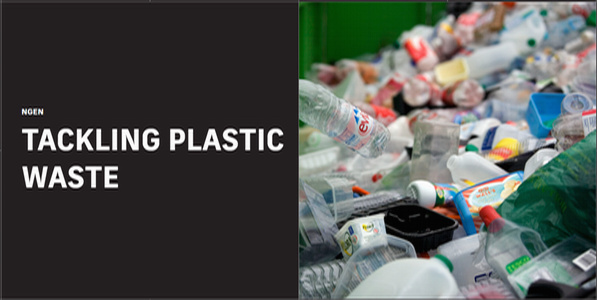SDG 14 - Strategic Initiatives
Outreach: Freshwater Ecosystems, Water Management, Overfishing
Western has several free and paid programs designed to educate and engage various audiences on the importance of water conservation, management, and overfishing for local and national community outreach.
- Biodiversity Inventory at Western University: All members of the community are invited to participate in data gathering to inform future conservation and environmental research activities, including aquatic species.
- Brief History of the Great Lakes Lake Trout Collapse: Peter Baker shares his knowledge of the causes and impacts of overfishing by explaining the science in layman’s terms in a public magazine article.
- Freshwater Forensics: The Upper Thames River Conservation Authority participated in the Science Olympics to help students investigate local water quality issues and consider the connections between land use and watershed health.
- Riverfest: An annual event hosted by the Indigenous Students’ Association, Indigenous Student Centre, and Western Sustainability that is free for the whole community. The festival events are centered around Indigenous perspectives on water management, viewing water as a living entity that requires respect, care, and a reciprocal relationship.
- SDG Month Canada: Western’s Centre for Research on Health Equity and Social Inclusionhosted Life Below Water: A Virtual Dive Into Our Oceans, a free, public, virtual exploration of our oceans, featuring stunning imagery, expert insights, and discussions about marine conservation and sustainable ocean management.
- STEM@Home: Water Cycle in a Bag: A free kit for kindergarten to grade 2 students that lets participants create a mini water cycle model through hands-on experiments. Educational videos and activities highlight the importance of freshwater ecosystems. The program invites families, schools, and community groups to get involved, promoting informed choices about water conservation.
- Tree Planting for Watershed Health and Climate Change Resiliency: Flooding is a significant climate change risk in London that can be reduced by planting trees along watercourses. In collaboration with the Upper Thames River Conservation Authority, Western’s free presentations discussed how planting trees using live stakes, a form of bioengineering, improves resiliency to flooding and overall watershed health.
- WaterAid Western: A club that engages students in discussions and activities related to clean water and sanitation issues, while raising awareness and funds on behalf of the organization WaterAid.
- Western Centre for Animals on the Move: Hosts formal and informal events to share ideas, hold workshops, and brainstorm. Animal research includes Song Sparrows, Meadow Vole, Chinook Salmon, as well as many other fish, birds, insects, and mammals.
- Central Canadian Symposium on Water Quality Research: Unites experts, researchers, NGOs, and stakeholders to tackle water quality issues. This event encouraged collaboration, knowledge sharing, and problem-solving, with attendees exploring the latest research and connecting with professionals and policymakers. Its interactive workshops provided strategies for improving and conserving water quality.
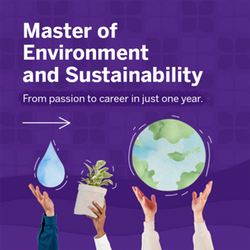
- Master of Environment and Sustainability Program: Equips students with practical skills in sustainability, marine ecosystem health, watershed management, and environmental leadership through interdisciplinary coursework, consulting projects, and paid co-op placements. Graduates are equipped to work in government, industry, NGOs, and social enterprises, contributing to areas such as climate change policy, water conservation, waste reduction, and sustainable development.
- Water Management Under Changing Climate: Workshops geared towards professional development for those engaged in climate change policymaking across all government levels.
In addition, Western upholds the Ontario Fishing Regulations, which provide guidelines on sustainable fishing practices. These regulations include restrictions on catch limits, seasons, and destructive fishing practices to protect fish habitats and ensure the sustainability of Canada’s marine resources for future generations. Western engages in initiatives like the Canadian Association for Food Law and Policy Conference, where students and faculty examine the interconnectedness of food systems. Topics covered at this conference were: regulation of new and emerging food technologies, freshwater fishing management, and governance of food security in northern and remote communities.
Sustainable Fisheries 
Western has several free and paid programs designed to educate local and national communities on the importance of sustainable fisheries, aquaculture, and tourism.
- 100% Great Lake Fish: Ontario Supply Chain Analysis: Published by Ivey, this free, online book provides data-backed strategies to improve the sustainability of the local fishery supply chain.
- Centre for Environment and Sustainability: Hosts an EnviroCon Conference annually. One speaker addressed small-scale fisheries and their sustainable management. This free conference is open to students, faculty, and community members.
- Discover the World Travel Program: This program offers educational travel opportunities for Western alumni, their families, friends, and the broader community. It combines adventure with education, focusing on cultural discovery and sustainable tourism
- Mark Biesinger: Listed on Stanford’s World’s Top 2% Scientists List (2018-2023), he conducts research on the science of finding, catching, and conserving fish. He freely shares his knowledge as president of Forest City Bassmasters, a local London club that hosts guest speakers and events with a focus on conservation activities.
- Marine Biomass Innovation Project: Western collaborates nationally with Indigenous communities to develop sustainable solutions for 100% biomass utilization. In partnership with Mi’kmaw communities, the project aims to co-develop sustainable, innovative, educational, marine-based technologies for local industries and community organizations.
- Western Marine Biology Society: This group hosts free local events, advocating for ocean conservation and sharing information about ocean fishery research and what it means to our world.

Sustainable Utilization of Rivers
Western supports and organizes events for the conservation and sustainable utilization of our local ponds, lakes, rivers, and marine resources, engaging students, faculty, and the broader community in both education and hands-on stewardship.
- Drinking on the Job - The Atlantic Fisheries: Part of the Joanne Goodman Lecture Series, this free, public event explored the historical relationship between rum, fisheries, and marine trade in Eastern Canada, serving as an accessible educational opportunity for the broader community to reflect on sustainable utilization and conservation of ocean and fishery systems.
- Field Research: Western teaches numerous water utilization-related courses with field research components that promote conservation of local bodies of water. As an example, Katrina Eyvindson teaches a course called Paleolimnology and Global Change. Her class typically conducts research on Tumbleson Pond and shares its findings with the local conservation group Western Ontario Fish and Game Protective Assn. Inc., contributing to the sustainable management of local bodies of water.
- Live Staking: Students, faculty, and community members worked with Western and the Upper Thames River Conservation Authority on a project using a form of bioengineering to keep water in Medway Creek and pollution and other contaminants out. Medway Creek runs through the Western campus.
- Riverfest: An annual occurrence, celebrating Deshkan Ziibi (Thames River) the local river. This event, which is free for students, staff, faculty, and the local community, focuses on Indigenous ways of knowing and conserving nature, emphasizing humanity’s duty to protect and honour the water flowing through Deshkan Ziibi.
- Water Management Under Changing Climate Workshop: Hosted by the Western Water Centre, it brought together water resource professionals from across Canada for a free, interactive three-day event. The workshop provided hands-on training using system dynamics models to simulate climate change impacts on water systems, including lakes and rivers. It promoted conservation and sustainable utilization by equipping practitioners with tools and strategies to manage water resources under future climate scenarios.
Maintain Biodiversity of Ecosystems
Western engages in research, industry, and local community collaboration to maintain and enhance ecosystems and biodiversity, including plants, animals, aquatic ecosystems, and those under threat.
- Campus as a Living Lab: This project unites faculty, staff, community, and industry partners to protect the biodiversity on our campus. Projects include:
- Barn Swallow Breeding and Nesting Structure: Provides suitable nest structures to support this species at risk.
- Bee Yard: Studies honeybee dance communication.
- Biophysics of Communication: Studies acoustic and vibratory communication in insects and spiders.
- Environmental Impacts of Road Salt: Industry and research collaboration, studying the environmental effects of de-icing salts.
- Hoverflies: Research into the migratory behaviour of North American hoverflies, important pollinators across all ecosystems in North America.
- Invasive Species Management: Management of buckthorn on campus, an invasive species that poses severe threats to local ecosystems.
- Centre for Animals on the Move (CAM): CAM conducts cutting-edge research on how animal movement is shaped by environmental and human factors, with a focus on conserving migratory and non-migratory species across Canada, including fish. Through initiatives like the Motus Wildlife Tracking System and isotopic analysis, CAM enables long-term monitoring and protection of biodiversity in ecosystems under threat. CAM partners with Georgian Bay Land Trust to support aquatic ecosystem health. CAM regularly hosts events to workshop ideas, brainstorm interdisciplinary collaborations, and learn new skills.
- Fisheries Management and Conservation Careers in Science and Technology: FishCAST supports early-career researchers doing work in Ecosystem & Habitat Assessment, Fisheries Ecology & Exploitation, Fish Health & Fitness, and Fish Culture. FishCAST is committed to providing equitable, high-value training to prepare individuals with the skills to pursue jobs in fisheries and aquatic science management and conservation through hands-on training.
- Genomic Network for Fish Identification, Stress and Health: GEN-FISH is a team of researchers, professionals, and community-members who are working to determine the location and abundance of Canada’s 200+ freshwater fish species, and measure how they are performing in the face of increasing (mostly human-caused) stressors, and how to launch effective early interventions.
- Global Water Futures Observatories (GWFO): Western partners with other universities, Indigenous communities, practitioners, policy-makers, government, industry, conservation, and other sectors to develop capabilities, reduce risk, and safeguard water resources. GWFO provides open access water data to monitor changes in water sources, diagnose risks to water security, and design sustainable long-term solutions.
- iNaturalist Canada - Western Chapter: Led by the Canadian Wildlife Federation, the Royal Ontario Museum, Parks Canada, and NatureServe Canada, it focuses on identifying species on campus, particularly those at risk. The Thames River, running through campus, is home to various animals such as waterfowl, beavers, and the spiny softshell turtle, a species at risk.
- Medway Creek Photo Stations: Western’s Medway Creek restoration project engages students and volunteers in planting native species to stabilize the creek bank and improve biodiversity. A public photo station tracks ecological recovery, supporting direct action to maintain freshwater ecosystems under climate-related stress.
- Pristine Alpine and Arctic Lakes: Researchers are investigating human impacts on remote ecosystems - geography professor Katrina Eyvindson and her team uncovered how climate change and agricultural activity are altering pristine alpine lakes, with rising temperatures and airborne nutrient deposition transforming lake chemistry and biology. Their work is aimed at understanding and mitigating human impacts on these fragile ecosystems.
- Real-Time Aquatic Ecosystem Observation Network: RAEON is a partner of GWFO, providing infrastructure and data management for Canadian to track, understand, and monitor freshwater ecosystems and their conditions. Forecasting and responding to threats like habitat loss and invasive species helps ensure the health and integrity of these ecosystems. RAEON improves understanding of the mechanisms and processes of large lake ecosystems and contributes to the management, rehabilitation, and enhancement of their ecosystem services.
- Sherwood Fox Arboretum: A collection of trees on campus, which represents the biodiversity of the Carolinian Zone, including an old growth forest.
- International Agenda for Botanic Gardens in Conservation: Signed by Western in 2003, it prioritizes plant conservation. Offers an interactive tour
- Western University Tree Dashboard: Offers an interactive tour of the arboretum.
- A Tour of Select Trees in the Sherwood Fox Arboretum: Tells the story of the biological and historical importance of the trees.
- WesternWater Centre (WWC): WWC collaborates with government, local municipalities, industrial partners, academic partners, and the local Indigenous community. The centre focuses on research leading to innovative solutions addressing all aspects related to clean water supply and water-environment issues, including the protection and management of water resources, resource recovery, and treatment technologies, to aid our aquatic ecosystems. It addresses all aspects related to clean water supply and water-environment issues, including the protection and management of water resources, resource recovery, and treatment technologies, to aid our aquatic ecosystems.
Water Standards
Western University adheres to stringent water quality standards and discharge guidelines to protect ecosystems, wildlife, and human health. Our wastewater is directed via the sanitary sewer system to the Greenway Wastewater Treatment Plant, ensuring compliance with the Ontario Water Management Quality Guidelines and the City of London’s Wastewater and Stormwater Bylaw. These guidelines are designed to safeguard all forms of aquatic life and their life cycles.
Western has implemented targeted measures to pre-treat greywater before it enters the utility’s sewer system, including the installation of sink grease traps in research laboratories. As a member of the Southern Ontario Water Consortium, Western collaborates with the City of London to demonstrate and validate innovative, near-market wastewater treatment technologies. Western also partners with the Government of Ontario on wastewater monitoring initiatives to enhance environmental protection and public health.
The WesternWater Centre supports improving these standards by conducting research on water and wastewater treatment.
Marine and Water System Pollution 
Western University has policies in place to prevent and reduce marine pollution of all kinds, particularly from land-based activities. This includes processes to prevent polluted water from entering the water system, including pollution caused by accidents and incidents at the university. Western University abides by federal, provincial, and municipal regulations, as well as our own policies, to protect water resources and prevent marine pollution.
- Canadian Environmental Protection Act: Regulates the disposal of wastes into bodies of water.
- Ontario Water Resources Act: Regulates water quality and prohibits the discharge of pollutants into Ontario’s waters.
- London’s Water By-law (W-8): Prohibits non-potable water from entering the water distribution system.
- London’s Waste Discharge By-law (WM-16): Regulates and enforces waste disposal into the public sewage systems.
- Western’s Policy on Environment and Sustainability: Commits to promoting sustainability and reducing waste and hazardous materials.
- Western’s Comprehensive Procedures: Prevent polluted water from entering the water system, including stringent protocols for handling and disposing of contaminated biowaste, emergency response plans for accidents, and regular safety audits to ensure compliance with environmental standards. Key policies include:
These policies are supported by emergency response plans, regular safety audits, and strict protocols for handling and disposing of hazardous materials, all of which help prevent land-based pollutants from reaching marine ecosystems.
Minimize Alteration of Aquatic Ecosystems
Western University has a plan to minimize physical, chemical, and biological alterations of local ecosystems, including aquatic ecosystems. Located within the Thames River watershed, the Thames River and Medway Creek flow through Western’s campus.
The university’s approach includes infrastructure planning, research, policy development, and community engagement. Key initiatives include:
- Campus as a Living Lab: Projects protect environmentally significant areas and species at risk, implements flood mitigation, and supports aquatic ecosystem health.
- Campus Master Plan: Restricts development on floodplain regions in accordance with the Upper Thames River Conservation Authority
- Disposable Plastic Water Bottles: Not sold on campus which reduces plastic waste that could enter waterways.
- Faculty of Engineering: Focuses on water research, including studies on water resources, source water protection, water quality, and treatment technologies.
- Green Spaces & Gardens: Maintained with native vegetation and invasive species management to support local biodiversity and reduce runoff impacts.
- Hazardous Chemical Waste Policy: Prevents contamination of the local ecosystem through safe disposal practices.
- Ontario Environment Assessment Process: Includes the Ministry of the Environment, Conservation and Parks reviewing new build sites for environmental impact and halted if risks to ecosystems are identified.
- President’s Advisory Committee on the Environment and Sustainability: Includes broad representation from faculty, staff, and students with a mandate to design and execute a Climate & Sustainability Strategy, including a focus on grounds management & biodiversity.
- Public Sustainability Commitments: Western is a signatory to regional, national, and international public sustainability frameworks that include aquatic ecosystem protections.
- Urban Stormwater Research: Investigates the impacts of urban stormwater runoff on the watershed and developing low-impact development strategies to reduce pollutants entering the Thames River.
- Waste Streams @ Western: Diverts waste from landfills, reducing the risk of leachate and runoff into aquatic systems.
- Western Open Space Strategy: Preserves forested areas along the Thames River and Medway Creek to protect riparian zones and aquatic biodiversity.
- WesternWater Centre: Leads innovative solutions to address water-environment issues, including the protection and management of water resources.
Watershed Management
Western’s campus is situated within the upper watershed of the Thames River, a distinct ecological system managed by the Upper Thames River Conservation Authority (UTRCA). Western actively contributes to the implementation of the UTRCA’s watershed management strategy, which is designed to protect, conserve, and restore the watershed in partnership with the community.
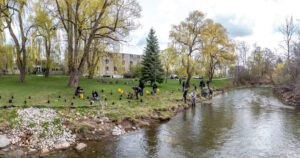 One example of this collaboration is the live staking project along Medway Creek, which runs through Western’s campus. This initiative helps stabilize stream banks, reduce erosion, and improve aquatic habitat. Western also works closely with UTRCA through its Flood Response Plan, which includes flood prevention measures and protocols to prevent hazardous material leaks into the watershed during extreme weather events.
One example of this collaboration is the live staking project along Medway Creek, which runs through Western’s campus. This initiative helps stabilize stream banks, reduce erosion, and improve aquatic habitat. Western also works closely with UTRCA through its Flood Response Plan, which includes flood prevention measures and protocols to prevent hazardous material leaks into the watershed during extreme weather events.
In the broader region, Western is located within the Great Lakes – St. Lawrence River Basin, one of the most significant freshwater systems in the world. The university supports the Ontario Ministry of the Environment, Conservation, and Parks’ watershed protection strategy, including the Clean Water Act, Ontario’s Great Lakes Strategy, the Canada-Ontario Great Lakes agreement, and the Great Lakes-St. Lawrence River Basin Sustainable Water Resources Agreement.
Western partners with the City of London to improve the water pollution prevention and control plan. The university is a key stakeholder in the city’s Adapting and Making London More Resilient Workplan, which prepares to adapt London to the increasing impacts of severe weather, particularly related to watershed-wide storm events. We work with the City of London to review the effectiveness of flood event response programs.
Through these partnerships and research initiatives, Western supports watershed management strategies that are informed by the location-specific diversity of aquatic species and the ecological needs of connected waterways. The university’s efforts reflect a commitment to balancing human needs with the protection and restoration of aquatic ecosystems.
Marine Technologies
Western researches and works directly with industries on technologies or practices that enable marine industry to minimize or prevent damage to aquatic ecosystems. Examples include:
- Marine Biomass Innovation Project: Works in partnership with Mi’kmaw communities and industry to develop sustainable, innovative, marine-based entrepreneurship opportunities and technologies through repurposing of marine biomass. Learn more on CBC Listen.
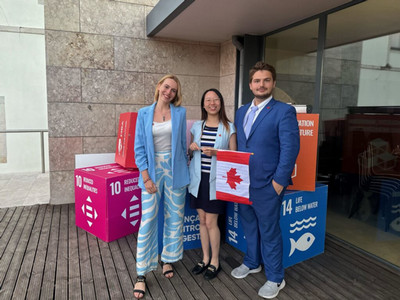
- Research for Subsurface Transport and Remediation (RESTORE): Conducts innovative research with national and international collaborations, and strong industrial partnerships, aimed at addressing the sustainable management of our water resources. While focused on soil and groundwater systems, the technologies developed (e.g. remediation methods and surface-groundwater interaction models) are directly applicable to coastal and marine environments where land-based contamination impacts aquatic ecosystems.
- Surface Science Western: Works with many industries and clients to identify and analyze the physical and chemical properties of microplastics to understand how they affect ecosystems, with the goal of minimizing harm done to the environment.
- Western Libraries Geospatial Hub: Provides access to interactive mapping tools and datasets that support environmental analysis, including water quality, watershed management, and land use impacts. These tools can be used by researchers and industry partners to assess and mitigate ecological damage in marine and freshwater systems.
- WesternWater Centre: Works with governments and industry on researching the impacts of climate change on our water resources to find innovative solutions addressing all aspects related to clean water supply and water-environment issues. This includes the protection and management of freshwater and coastal systems, resource recovery, and treatment technologies that help prevent pollution from reaching marine ecosystems.
- Xatoms: Co-founded by a Western student and supported by the Morrissette Institute for Entrepreneurship, Xatoms develops AI- and quantum chemistry-powered photocatalysts that purify water using light, helping reduce pollutants like pesticides, viruses, and bacteria in aquatic environments. Their technology is being piloted in river remediation and clean water initiatives, including in Kenya, with applications in filters and mesh systems that support ecosystem restoration.
Plastic Waste Reduction
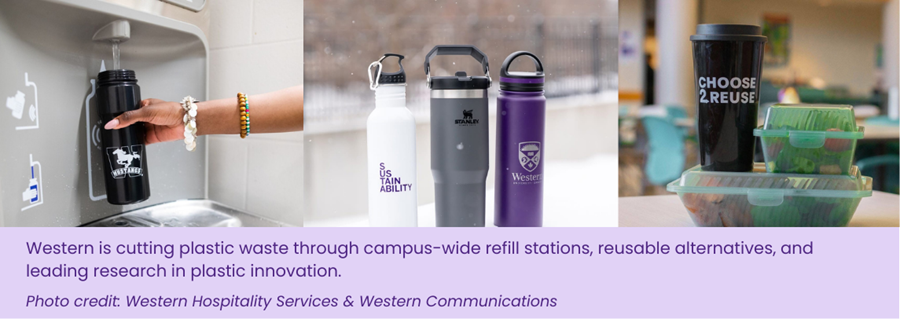
Western is committed to reducing plastic waste on campus through operational changes, student-led initiatives, and cutting-edge research.
- Compostable and Recyclable Containers: Hospitality Services have replaced conventional single-use plastic containers throughout campus operations.
- Eliminating Plastic Bottled Water: Western stopped selling plastic bottled water on campus at any university functions, vending machines, or by any on-campus restaurants or vendors. Free, accessible water is available across campus at more than 200 refill stations.
- Snack Wrapper Recycling: A student initiative has placed snack wrapper recycling boxes in many buildings across campus, focusing on high-traffic areas where people often eat.
- Straws, Stir Sticks, Bags, and Cutlery: We have replaced plastic straws with paper ones, plastic stir sticks with wooden options, and plastic bags with paper alternatives. Compostable cutlery and to-go dishware are available in all residence dining halls and at our catering events, and all disposable hot beverage containers are routed to the “organics” stream.
- Streamlining Surgical Trays: Dr. Strychowsky won a Western Green Award for changing processes at Western's affiliated hospitals to reduce impact and waste. She also implemented a reusable patient belonging bag program, replacing single-use plastic bags with a more environmentally friendly option.
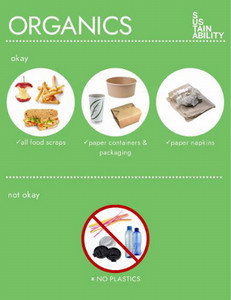
- What Goes Where at Western: Western has multiple waste streams to divert as much as possible from landfills to recycling, re-use, and organics.
In addition, Western is producing innovative research on converting plastics to other usable materials:
- Biodegradable Bioplastics: Rebecca Koshy, a fourth-year chemical and biochemical engineering student has pioneered an innovative solution to the plastic pollution problem by developing biodegradable bioplastics.
- Eating Asteroids: A groundbreaking project has developed an open-source bioreactor that can convert carbon from plastic into edible protein, offering a potential solution for plastic waste management.
- Fallona Family Interdisciplinary Science Award: Award winner Patricia Corcoran is a leading expert on microplastics pollution research, influencing disparate worlds of science and art with her discovery and depictions of human-caused pollution.
- Hemp-based Biomaterial: Elizabeth Gillies has worked to develop a new biodegradable, hemp-based material that could serve as a sustainable substitute for plastic packaging needs for a wide variety of products.
- Solar-Powered Charging Station Picnic Tables: The Western Sustainable Impact Fund is supporting a project to create picnic tables made from waste plastic composites with a solar panel tabletop to charge devices.
- SpecOptiBlend: An open-source software that enables custom-colored 3D printing using recycled plastics, helping reduce plastic waste through creative reuse.
- Tackling Plastic Waste: Next Generation Manufacturing (NGen) partnered with Ivey’s Innovation North to find solutions to plastic waste. NGen uses the information gleaned from the project to identify opportunities to secure supply chains, protect the environment, improve healthcare, support technology adoption, and facilitate digital transformations across Canada’s manufacturing sector.
- Upcycling PET into Food: Professor Joshua Pearce conducts research on ways to harvest edible microbial protein powder from plastic-eating microorganisms to make food.
Aquatic Ecosystem Health
Western is actively involved in monitoring the health of aquatic ecosystems, particularly through partnerships, research, and student engagement. Here are several ways this is being done:
- Campus Naturalization and Water Quality Protection: As part of the Campus as a Living Lab initiative, Western students, faculty, and community members planted native shrubs and trees along Medway Creek to stabilize banks and improve water quality. This project was supported by Upper Thames River Conservation Authority (UTRCA), Indigenous partners, and funded by a Thinking Globally, Acting Locally grant.
- Educational Integration: Courses in the Faculty of Science include fieldwork that teaches ecosystem management and monitoring techniques. Students collect data on water quality, biodiversity, and habitat conditions which are shared with local community groups.
- Fish Migration Monitoring in Medway Creek: A Western-led field team conducted fish sampling in Medway Creek to study migratory species and validate environmental DNA (eDNA) methods. Water samples were collected for molecular analysis to assess ecosystem health.
- Human Activity Altering Pristine Lakes: Western researchers are studying how human activity and climate change affect lake ecosystems in the Uinta Mountains. By analyzing sediment cores, they monitor long-term changes in water quality, biodiversity, and nutrient levels. This work helps identify ecological shifts and supports conservation efforts by providing data on the health of freshwater environments over time.
- Water Quality Monitoring in Medway Creek: Medway Creek, which flows through campus, is regularly monitored by the Upper Thames River Conservation Authority (UTRCA). Western collaborates with UTRCA through restoration projects and data collection efforts that support long-term water health monitoring.
- WesternWater Centre Research Initiatives: Several projects advance aquatic ecosystem health by monitoring wastewater, developing biodegradable, super-absorbent foams to remove water contaminants, and researching stormwater management and climate resilience in urban infrastructure.
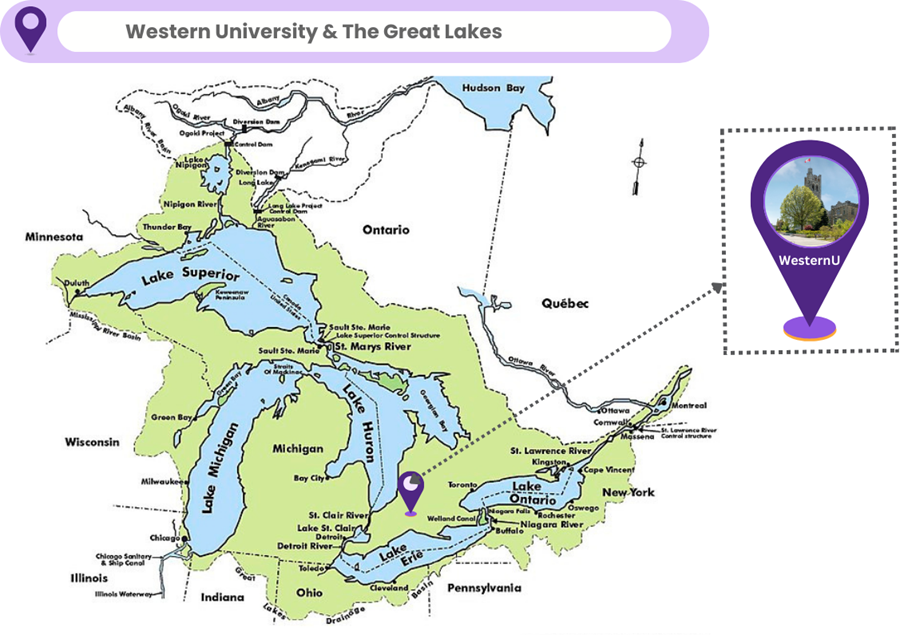
Western University is located within the Great Lakes – St. Lawrence River Basin, the world’s largest freshwater system. Map source: Wikimedia Commons
Good Stewardship
Western develops and supports programs that encourage good aquatic stewardship practices.
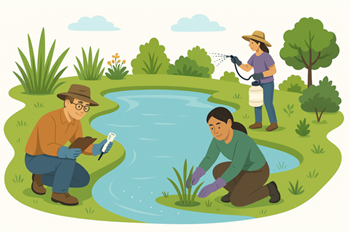
- Central Canadian Symposium on Water Quality Research: This symposium united experts, researchers, NGOs, and stakeholders to tackle water quality issues. This event encouraged collaboration, knowledge sharing, and problem-solving, with attendees exploring the latest research and connecting with professionals and policymakers. Its interactive workshops provided strategies for improving and conserving water quality.
- Global Water Brigades: An international movement of university students working alongside local communities and technicians to implement clean water systems in the developing world. The model systematically builds community ownership and collaboratively executes programs with the end goal of sustainably evolving to a relationship of impact monitoring.
- Ontario Water Consortium: Western collaborates with the City of London to demonstrate and validate innovative, near-market wastewater treatment technologies, promoting good aquatic stewardship practices. Additionally, Western has partnered with the Government of Ontario on wastewater monitoring initiatives to enhance environmental protection and public health. Our collaborative research focuses on sustainable water and wastewater treatment, contributing to the preservation and health of aquatic ecosystems.
- Research for Subsurface Transport and Remediation (RESTORE): RESTORE collaborates with government agencies on sustainable water management technologies that reduce threats to aquatic ecosystems. One current project is tackling winter road salt, which is contaminating freshwaters all year round.
- Riverfest: This is public, free annual event hosted by the Indigenous Students’ Association, Indigenous Student Centre, and Western Sustainability. The festival events are centered around Indigenous perspectives on water management, viewing water as a living entity that requires respect, care, and a reciprocal relationship.
- WesternWater Centre (WWC): WWC collaborates with government, local municipalities, industrial partners, academic institutions, and Indigenous communities to address clean water supply and water-environment issues. WWC focuses on research leading to innovative solutions for the protection and management of water resources, resource recovery, and treatment technologies, providing expertise and real-life solutions to government organizations and the industrial sector. WWC shares knowledge through workshops, seminars, and conferences, bringing the latest technological achievements and novel insights to its partners and the public.
These initiatives represent ongoing, institutionalized efforts by Western to promote aquatic stewardship through research, community engagement, and policy collaboration.
Food from Aquatic Ecosystems
Western University has a clear commitment to sustainability in its food sourcing, including products from aquatic ecosystems. According to the 2024 Hospitality Services Sustainability Report, Western ensures that seafood served on campus is sustainably harvested through the following policies and practices:
- Certified Sustainable Seafood: Western prioritizes purchasing seafood that is certified by recognized sustainability organizations such as the Marine Stewardship Council (MSC) and Aquaculture Stewardship Council (ASC). These certifications ensure that seafood is sourced from fisheries and farms that meet rigorous environmental and social standards.
- Ocean Wise Partnership: Western is a participant in the Ocean Wise Seafood Program, which helps consumers and institutions make ocean-friendly seafood choices. This partnership ensures that seafood offered on campus is responsibly sourced and supports healthy marine ecosystems.
- Procurement Policy: The university’s food procurement practices are guided by sustainability principles, including a commitment to reducing environmental impact and supporting ethical sourcing. This includes regular review of supplier practices and product certifications.
- Transparency and Reporting: Western publicly reports its sustainability efforts through annual publications, reinforcing its accountability and commitment to continuous improvement in sustainable food sourcing.
